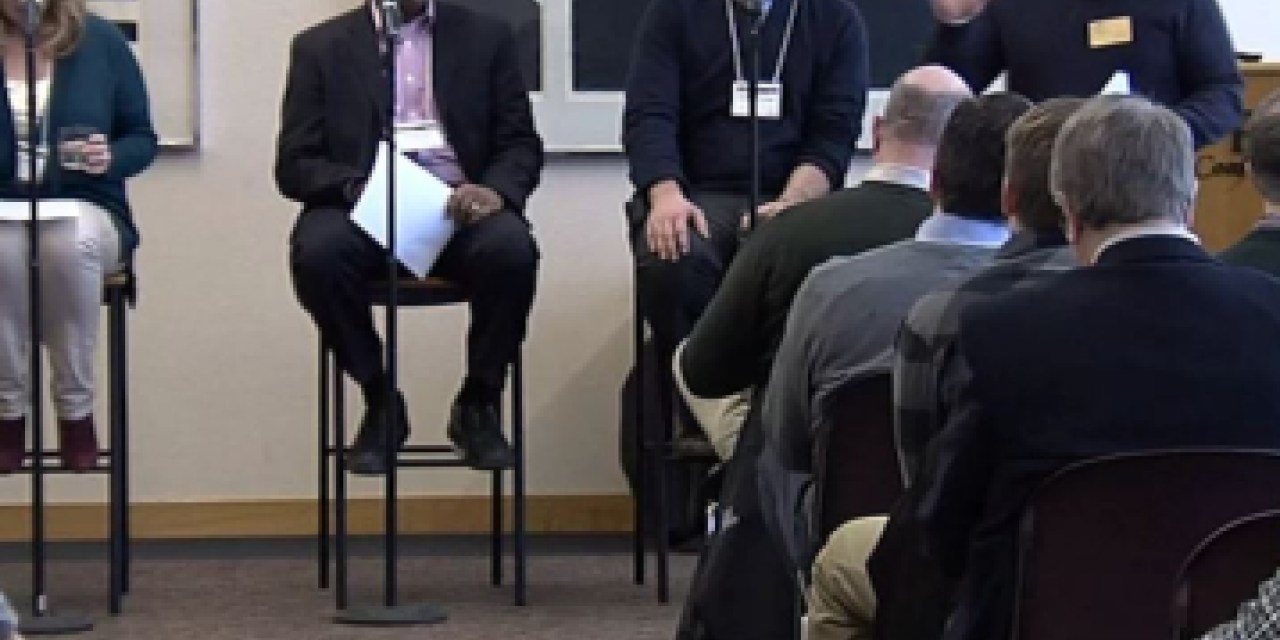“Faith and Work” has recently become a major theme of Christian renewal in congregations across North America and beyond. Our faith matters a great deal in how and why we work, but how are worship and work connected? The liturgy affects how we approach our weekday work, but our weekday work also shapes how we inhabit Sunday worship.
Cory Willson, a professor of missiology and missions at Calvin Theological Seminary in Grand Rapids, Michigan, moderated a panel discussion at the 2016 Calvin Symposium on Worship about how people might think strategically about the role of Sunday worship in breaking down the sacred/secular divide and raising up a people of disciples to live in the reign and rule of Jesus. Here’s what panelists had to say at the discussion and in written responses to these questions:
- What is your ministry context and pastoral challenge within this context?
- How do you picture the relationship of Sunday worship and Monday work?
- Which public worship practices help your congregation connect worship and work?
- How do you gather stories of people’s work lives so you can relate public worship to faith and work?
Click on photos to read responses
 |
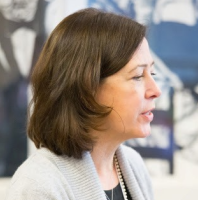 |
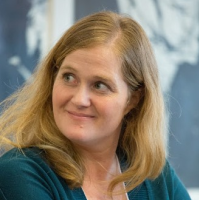 |
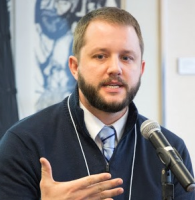 |
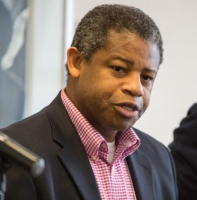 |
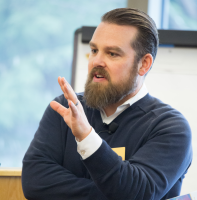 |
Peter Choi is a pastor at City Church San Francisco, California. He is a senior fellow at the Newbigin House of Studies and a member of the Newbigin Faculty at Western Theological Seminary in Holland, Michigan.
Context/challenge: Our urban context in San Francisco is full of contrasts between wealth and poverty, newcomers and families who’ve been there for generations, breathtaking vistas of beaches and the smells of life’s brokenness on every street corner. There’s an openness to opportunity and experimenting.
The challenge is that we live in a very distracted age. San Francisco’s fast pace of life is characteristic of our times. I know a woman who within 18 months went from working at Google to DropBox to now Uber. There’s nothing wrong with her. She has great relationships with her bosses and mentors. This is the new normal for many people. What does it mean to be faithful in the midst of constant change? How do we hold together both the beauty of creation and the messiness of life?
Sunday/Monday: We find the vital link between worship and work throughout Scripture, beginning with the fact that in Hebrew, the word for worship and work are one and the same. We see this connection in the story of Cain and Abel when the two brothers enter into worship bearing the work of their hands. Cain brought the fruit of the ground, Abel the fat portions of his firstlings. Both appear to understand that worship and work are essentially connected. There is a further lesson for us when things go awry in this story. Cain’s failure in worship leads to a breakdown of his relationship with God and with his brother. Not only does the sibling rivalry of Cain and Abel descend into the first worship war in the Bible, it also spirals out of control into vocational competition. Failure in worship and failure at work appear to go hand in hand in Genesis 4, where Cain’s failure is twofold: He fails to love God and he fails to love his brother.
In an age of dull, increasingly mechanized and even dehumanizing work, worship reminds us that God designed our labor to be life-giving. Christian faith helps us recognize both the indignities to which our work can drive us and the glorious heights we are capable of scaling as we work.
Connecting Sunday’s worship to Monday’s work is the goal of a Christian vision of work and our path to faithful obedience. In an era of telecommuting, cubicle-inhabiting and isolating work, gathering for public worship reminds us of the beauty and value of corporately setting our sights beyond our individual selves. In this biblical vision, faith and work are as closely linked as breathing in and breathing out. Sunday’s worship and Monday’s work are each a dress rehearsal for the other. We can become people who worship like we work and work like we worship.
Worship: Worship can help people move into a bigger story. Irish poet and philosopher John O’Donohue talked about how we wrestle with the reduction of identity to biography. In an interview with Krista Tippett, he , “Your identity is not equivalent to your biography.” In worship, we have an opportunity to invite people to turn off their cell phones, slow down and enter into a bigger story, one that’s “much larger than your vocation and connects to the entire rest of your life.” We can say, “Many of you have been living by a narrative that’s been given to you or imposed on you by culture—and it’s made you exhausted. Now we have an opportunity to reflect on what’s really ‘the true story of the whole world,’ as British theologian N.T. Wright said. This is a moment for us to be reunited to God and to reach out with hope for the world.”
Living into this bigger story helps us practice loving God and loving people in worship as well as work.
In worship, we work together to reenact relationships marked by faith, hope and love. We see in the gathered body a vision of co-laboring unity despite profound differences. Multisensory worship lets us see, hear, touch and taste the peaceable kingdom of God. Public prayers model godly speech and self-giving love instead of self-aggrandizement. They help us imagine using words not to impress but to bless. (The Worship Sourcebook has prayers and outlines to help you construct prayers.) Preaching helps us hear the very words of God declaring a message of redemption. Music and art point us to the power and gift of creativity.
The table spread before us invites us to touch, smell and taste deep truths we are incapable of speaking or understanding. Worship––in all its facets and movements––models for us the kind of work in which we might labor to restore and express God’s shalom for the world. Because worship represents God’s hospitality to all, it’s important how we word the invitation to the table: “For those of you who are exploring faith, please feel no pressure to come to the table if it would not be an authentic expression of where you are. But we invite you to make this a sacred time for you as well, perhaps using these prayers for those not communing, as printed in the worship folder, as a means of reflection.”
Stories: It’s easy for me as a pastor to talk about the idolatry of work for other people and not spend enough time recognizing the good they do at work. It’s important to ask people what they do, to notice the beautiful and innovative things and to cheer them on. It’s good for pastors to enter into workspaces where church members have a title, authority and influence.
We need to be attentive enough as pastors to be able to reflect the congregation’s experience. We can do this in pastoral prayers, sermon illustrations and inviting others to tell their stories in worship. Stories help people in your congregation enter into imaginative space, so we speak words that people can imagine themselves speaking in their own prayer life.
 Laura Robinson Harbert is dean of the chapel and spiritual formation and assistant professor of psychology at Fuller Theological Seminary in Pasadena, California. Before that she spent 26 years as a clinical psychologist. Harbert teaches a course on integrating psychology and theology.
Laura Robinson Harbert is dean of the chapel and spiritual formation and assistant professor of psychology at Fuller Theological Seminary in Pasadena, California. Before that she spent 26 years as a clinical psychologist. Harbert teaches a course on integrating psychology and theology.
Context/challenge: I’m ordained in the Presbyterian Church (USA) and have served as a part-time parish associate, but being responsible for worship every week is new to me. Fuller is a multidenominational, multicultural seminary with people from many theological and church traditions. Only half our seminarians go on into church ministry. The others go into a variety of marketplace ministries, such as the arts, education, business or international development.
Our chapel congregation experiences different languages and worship styles. It includes everyone from Jimmy, who works in building services, to John, an internationally known Old Testament scholar. How do we create worship that is unifying across all levels of hierarchy, so everyone can join in on a certain level?
Seminary is supposed to disrupt your thinking about God. That’s how we grow. But the challenge is learning how to live with the questions. What many students learn in class about biblical interpretation shakes their faith to the core. They tell me, “I learned today that Adam and Eve may not have been real people. I don’t know what to do with that.” I see worship as helping them hold together their journey of studying Scripture academically and critically, while still living with the Word of God over them as something that speaks to and shapes them and that they submit to. Each month they hear our president, Mark Labberton, preach passionately and grapple with the Word of God. They feel the presence of the Holy Spirit in his preaching. I want students to get used to thinking that part of good worship is being disrupted and uncomfortable yet remaining open to Christ in unexpected ways.
Sunday/Monday: “The earth is the Lord’s and all that is in it” (Ps. 24:1)! Sunday worship is intricately woven in with Monday’s worship and Tuesday’s worship. Romans 12:1 reminds us that our “true and proper worship” is to present our bodies, our whole selves, our whole lives, as a living sacrifice. Worship never happens only on Sunday. I think a better way to think about this question is, “How is our work worship?” Or, “What or whom are you worshiping when you go to work on Monday? Is it the same God you were worshiping yesterday in church?”
Worship: It’s important to me for people to experience and understand chapel as a place of worship, questions, mystery, discomfort and spiritual growth. When I accepted this job and felt completely inadequate, I felt the Lord gave me this passage about how worship forms us: “[W]here the Spirit of the Lord is, there is freedom. And all of us, with unveiled faces, seeing the glory of the Lord as though reflected in a mirror, are being transformed into the same image from one degree of glory to another; for this comes from the Lord, the Spirit” (2 Cor. 3:17–18). Having unveiled faces means being authentic. Worship can help people unveil their faces, especially when prayers are authentic. Worship can prepare you to go to your work as a used car salesman or teacher or whatever as an authentic person who wants to engage someone else. Too many workplaces make people feel as if only products and deadlines matter. Being a human being to another human being is something a lot of people don’t feel at work.
We offer chapel once a week as a gathering time for the Fuller Seminary community, and I am very interested in how the sacrament of the Lord’s Supper can impact the way staff, faculty and students experience their work. Any seminary or higher education institution has hierarchies. The faculty is usually seen as the ruling class, followed by students, with staff a distant third. Yet the Lord’s table invites all to come as equals, sinners who desperately need to be forgiven, cleansed, redeemed and reconciled. This sacrament—which levels all distinctions of class, education, race, privilege and power of any kind—means so much to me. For these 50 minutes, we are simply brothers and sisters in Christ.
I would like to strengthen our corporate worship through prayers for suffering peoples and places, so that we all experience prayer as a fundamental aspect of our shared life together. We pray for one another and we pray for the world—every day. I would love for department managers to find ways to bring prayer into the daily tasks of every office at Fuller. International Justice Mission (IJM) inspires me because each workday they allot 30 minutes for private, solitary prayer and 30 minutes for corporate prayer for everything going on in their different field offices.
Stories: You can go to people in their workplaces and minister to them there. Asking a simple question can lead to connections and conversations that feel holy. In my work I get to listen to stories of lives I can hardly imagine, like living in a refugee camp in Liberia from ages 6 to 11, or having a niece in Kenya jump out a second-story window and die because she hadn’t been told that the “terrorists” were actually people performing a terrorist drill. When our faculty and staff gather each week to pray, we hear about unbelievable suffering in China and Africa. I’m interested in ideas that help people in the congregation develop daily rhythms of prayer, such as the Benedictine Way or fixed hour prayer. These help us see our life at work as an extension of God’s kingdom.
 Meg Jenista is pastor of the Christian Reformed Church of Washington, D.C. She’s also pursuing a master of theology degree in preaching at her alma mater, Calvin Theological Seminary. Jenista serves on the board of The Young Clergy Women Project.
Meg Jenista is pastor of the Christian Reformed Church of Washington, D.C. She’s also pursuing a master of theology degree in preaching at her alma mater, Calvin Theological Seminary. Jenista serves on the board of The Young Clergy Women Project.
Context/challenge: Remember the U.S. government shutdown in 2013? Half my working congregation was out of work. People in my congregation are deeply invested in the FDA, DOJ and other federal agencies. So when I see people complaining on Facebook about the government, I think, “You’re talking about thoughtful Christian people I know by name.” Our church’s retired population is predominantly people from the neighborhood, which is African American. I have heard firsthand stories of Martin Luther King Jr. and marching in Selma, Alabama. Teenagers in my congregation pray about campaign financing when they lead our morning prayer.
One challenge is realizing that the pastor is no longer the most educated person in church. As we pastors more and more serve in congregations where members’ education far exceeds ours, we have to let go of old views of pastoral authority in honor of the priesthood of all believers. We need all believers in the body to wrestle with how they see God in their work.
Sunday/Monday: I have a very strong sense that worship is a regrouping and equipping of the saints. I often say that pastors love the people in their congregations because that’s part of the job. But I find the people in my congregation endlessly fascinating as well, which is a perk. When we ask about the connection between Sunday worship and Monday work, we presuppose that the formation of Sunday comes first. It might be more instructive sometimes to refer to the connection between Friday and Sunday so we can acknowledge what congregation members have to offer because of where they work, volunteer or live, or what they are reading or encountering in their home life.
Worship: I have worked with parishioners in the preaching task. If you use Paul Scott Wilson’s four-page sermon method, then page one is trouble in the text, page two is trouble in the world, page three is grace in the text and page four is grace in the world. Everyone in the room is just as qualified as the pastors to describe trouble and grace in the world, so why don’t we let them? My denomination doesn’t have a tradition of lay preaching, but it’s often possible to do a tag team, where we preachers do our work on pages one and three and congregation members fill in the pages two and four. I’ve co-preached a sermon with a woman who is writing a biography of Horatio Spafford, author of the hymn “It Is Well with My Soul.” She used his story for the example and application (pages two and four).
For a sermon series on Colossians, we leaned on Sylvia Keesmaat and Brian Walsh’s book Colossians Remixed: Subverting the Empire. My worship leader, Katie Roelofs, found people from church to give testimonies about how they see God in work. A schoolteacher told about living in the segregated South in Birmingham, Alabama. A neurobiologist who studies ALS and Alzheimer’s disease talked about seeing God in a molecule. During Epiphany, a NASA scientist reviewed the scientific record about “the star in the east.”
We have many good writers, so we’ve created in-house devotionals around preaching series themes. About twice a month, we ask someone in the congregation to offer the morning prayer, and I am always impressed. I wish we had time for a sermon discussion after the worship service where we could draw out people’s life experiences. We’ve done some things with visual arts. I wish we could do more.
One of the earliest recorded blessings of the church is “May God bless you and the work of your hands.” Why do we not have people standing at our church doors after the service to say, with oil, “May God bless you and the work your hands in this coming week”?
Stories: As pastors, we can invite people to coffee and create space for them to ask (or in some cases, answer) how they see God in their work. We can invite them to share those stories in sermons. Visiting people of your congregation is incarnational ministry. I’ve noticed that everyone in my congregation under age 30 is especially eager to have me bring an elder and sit in their living room and ask about their life. As much as we are ordained to be God’s representatives, our people want God in their life. When their pastors are fascinated by what they do, they begin to think that God might actually love and value what they do for a living.
When we recognize how much we have to learn from people in our congregation, it changes the dialogue. It honors the priesthood of all believers and the Kuyperian idea that God’s beauty and wonder is manifest all over in places I can’t possibly understand.
 Matthew Kaemingk is director of Fuller Theological Seminary's Institute for Theology and Northwest Culture based in Seattle, Washington, and editor-in-chief of the online journal Christ & Cascadia. His research focuses on the deep connections between worship, work and public life.
Matthew Kaemingk is director of Fuller Theological Seminary's Institute for Theology and Northwest Culture based in Seattle, Washington, and editor-in-chief of the online journal Christ & Cascadia. His research focuses on the deep connections between worship, work and public life.
Context/challenge: My working context in Seattle is Microsoft, Amazon, Expedia, Zillow, T-Mobile, Starbucks and Boeing. I work with churches filled with employees at world-changing, forward-thinking multibillion-dollar companies. These people are creating technologies that are changing and will change the world. And yet they participate in Sunday worship that reads a very old book and does very old things.
What do these Sunday and Monday practices have to say to one another? I know a guy in charge of designing Microsoft Outlook. Does God care about email? Does God hate spam? I direct a program in Seattle called Cascade Fellows. We partner with 10 churches in greater Seattle. Each church brings together small groups of professionals who want to work through questions of work and worship. And we work with our churches on developing worship services that make the connection with work.
A pastoral challenge is that many people think of Sunday morning as a time to forget the stresses and worries of their workweek and focus on God and “spiritual things.” This devastates the idea of acting out what we do on Sunday when we get to work on Monday. Philosopher Nicholas Wolterstorff presents a beautiful picture of worship as a heartbeat. Just as a heart draws in blood and sends it out, we are to bring our workweek to God in worship. We’re to present to God the beautiful things, like getting a promotion, closing a deal or finishing a product. We’re also meant to set our confessions, tears and laments before God. We allow Sunday worship to transform and teach us, and we’re sent back out with that vision into our work.
Sunday/Monday: What often happens in the faith and work discussion is that people say, “Your work on Monday is worship.” That’s absolutely true and God takes delight in our work. But the danger is thinking, “Well, work is worship, so Sunday doesn’t really matter.” No! Actually Sunday worship is that critical heartbeat when you are drawn in and given life for the week you’re sent out to. The Sunday/Monday connection doesn’t end with retirement. Our Cascade Senior Fellows program includes the idea of retirement as a calling because you have a whole portfolio of experiences and networks to use in God’s larger mission in the world.
Worship: We can do more with commissioning services. It’s common to bring up the high school team that’s going to Mexico on a mission trip and pray for them. Why not bring the teachers forward in September or all the retail workers in late November and pray for them? Someone may forget your sermon on how your work matters to God, but they’ll never forget that they were brought forward in the liturgy so their work in engineering could be prayed for.
We can have people pull out their cellphones and say, “We know you have a busy week coming up, with meetings and difficult conversations. We want you to bring that to God, and enjoy the silence around you as a gift.” Then give them three minutes to pray through their calendars.
We can frame the Lord’s Supper in a way that connects to people’s work. Bread and wine are products made by human beings, so celebrating with them celebrates that God works through ordinary things that we make. Rather than think of products as “secular,” we can remind worshipers that God is part of our work and he uses the work of our hands. This holy meal we are about to enjoy is meant to give us strength for the week. It’s not by our power that we work but by the power of Christ in us. This meal has consequences. When we come to the table, we’re meant to examine our week according to the countercultural values of the Lord’s Supper—community, sharing, humility and consumption that sustains us rather than making us hungrier.
Stories: Those of us who are pastors and worship directors need to meet with people and really ask them about their work, to show empathy for the difficulty of being the only Christian in the law firm. Knowing their stories helps you plan worship that helps them. We need to watch our language and visuals so that we don’t give the message that work in ministries, missions, nonprofits or social justice is a “higher calling” that the rest of us merely work to support. Our church has a “God on the Move” display, a map that shows our missionaries in Venezuela and the Philippines as well as the homeless shelter and food pantry where we serve. What if our mission map also had Amazon, Zillow, the children’s hospital, the nearest school and our homes to liturgically recognize that all of us are part of the mission of God?
 Reginald “Reggie” Smith is a pastor in the Christian Reformed Church who recently served as senior pastor of Roosevelt Park Community Church in Grand Rapids, Michigan.
Reginald “Reggie” Smith is a pastor in the Christian Reformed Church who recently served as senior pastor of Roosevelt Park Community Church in Grand Rapids, Michigan.
Context/challenge: I’m a resident of southwest Grand Rapids. My next- door neighbor is Hispanic. He’s concerned about whether his job at the turkey slaughterhouse is safe, and he’s asked me, “What does God have to say about the work I have to do? Oh, and by the way, my aunt is ‘illegal.’” A funeral director in my congregation wonders what it means to do his job Christianly. A retired homemaker asks, “What can I really do that God really pays attention to?” I live two blocks from the church, so my neighbors’ problems are my problems Sunday through Saturday.
The challenge in my neighborhood is reestablishing what it means to be a child of God. How does that identity supersede being employed and getting a paycheck? What does it mean to be transformed through Sunday worship so that you model a different way of acting and believing to your coworkers? And how do my people believe that God is working powerfully through them and sees them as important no matter how anyone else sees them?
Sunday/Monday: Sunday worship is the space where God challenges and sustains the people of God for the work of being his witnesses in the public and private places of work. I don’t see employees or owners. I see the human pictures of grace and witness who enter their various professions on Monday with a renewed identity as a child of God and agent of grace. Monday becomes the place where Sunday is put into practice despite challenges from many directions. Sunday doesn’t end on Monday; it continues through the daily work of people who yearn to live as Christ followers.
I see the connection theologically and pastorally from a Christian community perspective. I have meetings and conversations during the week with the same people who deal with cranky coworkers and ethical dilemmas. I connect them back to Sunday and their identity as a child of God and a witness to others by their living. The apostle Paul, a bi-vocational pastor, informs my vision. He integrated, not separated, the life of work and the life of the church in the public arena.
Worship: God is the most fascinating, most powerful person in the world—a person who decided to be in our lives and also take us with him in our seven-days-a-week life.
The Word, worship and prayer strongly reinforce the Sunday worship/Monday work connection. The Word isn’t information to use or master as homework. The Word forms and shapes hearts, wills and minds so we live out of a Christian vision of witness and service to the master. This leads to worship. Worship, with music, fellowship, sacraments and liturgy, doesn’t have the productive tone of doing something. Worship is the business of paying attention to God’s voice and listening to a way of living far greater than dollars and cents.
Lastly, if we want to become more and more like Christ, then we must bring our work and business challenges before the Lord in prayer. Our church’s prayer time is more than just requests. It’s also confession. People feel comfortable to say, “I really don’t like my coworker and I’m going to have to ask the Lord to help me before I kill her.” That’s honesty. God cares that we bring our weekday honesty to Sunday worship, because God wants us to be authentic people every day.
That friend with the difficult coworker hated her job, but it was the only way for her to put clothes on her kids’ backs and food on the table. Her honesty showed other worshipers that we don’t have to be super- Christians. After worship, she told me, “I feel better now that I’ve confessed this.” She also created an atmosphere for other people to feel free to confess the same thing. Shared honesty creates a sense of common life. We get to watch each other being transformed.
We also need to talk liturgically about spiritual warfare, about the powers and principalities at work in any business or service. I no longer wish to hear someone say after worship, “Well, time to go back to the real world.” Sunday worship doesn’t get more real than the sword of the Word slicing and dicing the lies of success on our terms, our Lord who does battle behind the scenes of commerce and government, and the Spirit’s help to model a life of witness and grace. For one Sunday in our church, we brought the baptismal font to the entrance to remind people of their baptized identity. Saying or hearing it means even more when combined with the power of touching your hand in the water and to your forehead. I find it interesting that Jesus encountered the devil to remember who he was.
Stories: I think congregations could be strengthened by providing community groups where both members and seekers discuss God’s vision of changing the world through their work. As Eugene Peterson says, you don’t know a person’s story till that story is listened out of them.
A young lady at church got hired at Taco Bell. She hadn’t grown up with any work experience at all. She was a new Christian and not sure how to live that out at work, especially with those in authority. She had an attitude that if anyone got in her face, even a customer, that’s it. She and I went back and forth. “You know, Pastor Reggie, I had to give it to him.” I’d say, “Now let’s connect that back to the new thing Christ is doing in you.” On Sundays, she was fervent in hearing and in worship. She taught me how to re-engage the ministry of listening. She said, “I’m going to try this Jesus thing. I’m going to listen.” So she spent a whole week listening to the customers, which was very hard thing for her to do, because she sure wanted to cuss out some of them. She came back the next week and said, “I saw God show up.” She paid attention not only to her customers but also to what God was speaking inside of her.
 Cory Willson is the Jake and Betsy Tuls Assistant Professor of Missiology and Missional Ministry and director of the Institute for Global Church Planting and Renewal at Calvin Theological Seminary in Grand Rapids, Michigan. He is cofounding editor of the journal Evangelical Interfaith Dialogue.
Cory Willson is the Jake and Betsy Tuls Assistant Professor of Missiology and Missional Ministry and director of the Institute for Global Church Planting and Renewal at Calvin Theological Seminary in Grand Rapids, Michigan. He is cofounding editor of the journal Evangelical Interfaith Dialogue.
Context/challenge: I work at the intersection of the church and academia. I spent six months doing ethnographic research in three churches—one each in Long Beach and San Francisco, California, and one in Phoenix, Arizona. I researched congregational approaches to vocational discipleship as I tried to understand the experiences of Christians in corporate worship and weekday work.
I learned that work is not the most pressing issue that evangelical churches deal with today, but it is perhaps one of the most strategic ways that a church can engage in Christian discipleship. If we believe that Jesus is the Lord over everything, then all of life, private and public, must come under God’s rule and reign. But this raises the more difficult question: how do we disciple Christians to do this? That’s why it is so strategic to relate work to discipleship formation. After patiently listening to my struggles to bring together many Christians’ work stories with the scholarly literature, theology professor Cornelis van der Kooi said to me: “Cory, I want to challenge you to view the interviews not simply as sociological research but as an attempt at discerning the work of the Holy Spirit in each person’s life.”
Sunday/Monday: Besides handling words from the Word, pastors and local church leaders should help Christians discern the Holy Spirit at work in their lives. Teaching a class or preaching a sermon series about work is good but incomplete. Pastors need to come alongside and take an interest in workers so they connect more deeply with their work and the Spirit’s action there. When pastors help people see their work experiences as a means of understanding God and themselves, then they grow as disciples who desire to bring all of life under Christ’s lordship.
Sunday worship plays a vital role in the church’s rhythm of gathering and scattering. As a community of priests (1 Pet. 2:9), we are given the special role of being Christ’s ambassadors (2 Cor. 5:20) through whom God makes his appeal to others through our words, deeds and lives. Our priestly role calls us to bring what philosopher Nicholas Wolterstorff calls trumpets of praise, ashes of repentance and tears of lament from around the world as we gather for corporate worship. As we voice these in the liturgical practices of word, eucharist, baptism and fellowship, we align our lives and our world with the story of God’s work in this world. God meets us in these communal practices, nourishes us, instructs and guides us and sends us back into the world to serve him afresh.
Worship: From my experience and my qualitative research in congregations, I think the most profound practices that influence public worship are those that help worshipers actively bring the experiences of the workweek (trumpets, ashes, tears, petition) into Sunday worship. This can take the form of rehearsing these trumpets, ashes and tears of the week on the drive to church as a family, or perhaps pausing before the benediction to visualize what lies ahead in the coming week. Think about what makes you anxious or the coming week’s faces and events or where your mind runs off to. Then receive the words of the benediction as a mini commissioning service for the week ahead.
Stories: I would like to see liturgists and pastors engage in a regular pattern of interviews with their parishioners to learn from them how they inhabit the liturgy and the various practices that they intuitively construct or engage in.

